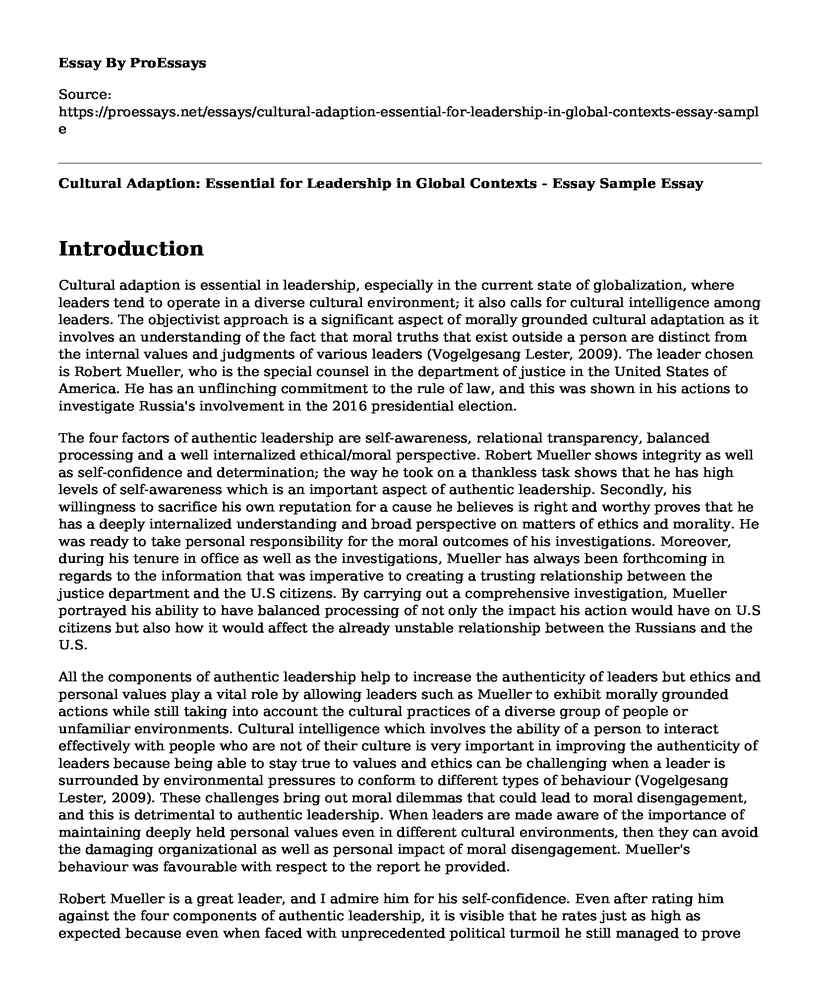Introduction
Cultural adaption is essential in leadership, especially in the current state of globalization, where leaders tend to operate in a diverse cultural environment; it also calls for cultural intelligence among leaders. The objectivist approach is a significant aspect of morally grounded cultural adaptation as it involves an understanding of the fact that moral truths that exist outside a person are distinct from the internal values and judgments of various leaders (Vogelgesang Lester, 2009). The leader chosen is Robert Mueller, who is the special counsel in the department of justice in the United States of America. He has an unflinching commitment to the rule of law, and this was shown in his actions to investigate Russia's involvement in the 2016 presidential election.
The four factors of authentic leadership are self-awareness, relational transparency, balanced processing and a well internalized ethical/moral perspective. Robert Mueller shows integrity as well as self-confidence and determination; the way he took on a thankless task shows that he has high levels of self-awareness which is an important aspect of authentic leadership. Secondly, his willingness to sacrifice his own reputation for a cause he believes is right and worthy proves that he has a deeply internalized understanding and broad perspective on matters of ethics and morality. He was ready to take personal responsibility for the moral outcomes of his investigations. Moreover, during his tenure in office as well as the investigations, Mueller has always been forthcoming in regards to the information that was imperative to creating a trusting relationship between the justice department and the U.S citizens. By carrying out a comprehensive investigation, Mueller portrayed his ability to have balanced processing of not only the impact his action would have on U.S citizens but also how it would affect the already unstable relationship between the Russians and the U.S.
All the components of authentic leadership help to increase the authenticity of leaders but ethics and personal values play a vital role by allowing leaders such as Mueller to exhibit morally grounded actions while still taking into account the cultural practices of a diverse group of people or unfamiliar environments. Cultural intelligence which involves the ability of a person to interact effectively with people who are not of their culture is very important in improving the authenticity of leaders because being able to stay true to values and ethics can be challenging when a leader is surrounded by environmental pressures to conform to different types of behaviour (Vogelgesang Lester, 2009). These challenges bring out moral dilemmas that could lead to moral disengagement, and this is detrimental to authentic leadership. When leaders are made aware of the importance of maintaining deeply held personal values even in different cultural environments, then they can avoid the damaging organizational as well as personal impact of moral disengagement. Mueller's behaviour was favourable with respect to the report he provided.
Robert Mueller is a great leader, and I admire him for his self-confidence. Even after rating him against the four components of authentic leadership, it is visible that he rates just as high as expected because even when faced with unprecedented political turmoil he still managed to prove that the institutions of justice still work (Tillman, 2018). His investigations touched on both Russian and U.S.A citizens, but this did not interfere in any way with his deeply held values of justice and the rule of law. He stuck with the evidence and exposed a number of wrongdoings while taking into account the differences in culture between the countries involved. As an aspiring leader, I would like my personal values and ethics to drive my actions in all circumstances but at the same time, understand the difference between culturally influenced moral judgments and the universal moral principles. Equipped with these aspects of effective leadership, leadership authenticity becomes easy to achieve.
References
Tillman, S. B. (2018). Is Robert Mueller an officer of the United States' or an employee of the United States'?.
Vogelgesang Lester, G., Clapp-Smith, R., & Palmer, N. (2009). The role of Authentic Leadership and cultural intelligence in cross-cultural contexts: An objectivist perspective. International Journal of Leadership Studies, 5(2), 102.
Cite this page
Cultural Adaption: Essential for Leadership in Global Contexts - Essay Sample. (2023, Feb 27). Retrieved from https://proessays.net/essays/cultural-adaption-essential-for-leadership-in-global-contexts-essay-sample
If you are the original author of this essay and no longer wish to have it published on the ProEssays website, please click below to request its removal:
- IKEA: Business Ideas and Strategies. Management Essay Example.
- The Role of Ethics Officer in the Scenario and Address Paper Example
- General View of the Business Strategy - Research Paper
- General Electric Company Case Study Paper Example
- Assessing Political Risk Essay Example
- Essay Sample on Organizational Change: Driving Improvement and Efficiency
- Paper Example on IT Governance: A Key to Success in Online Retail Business







